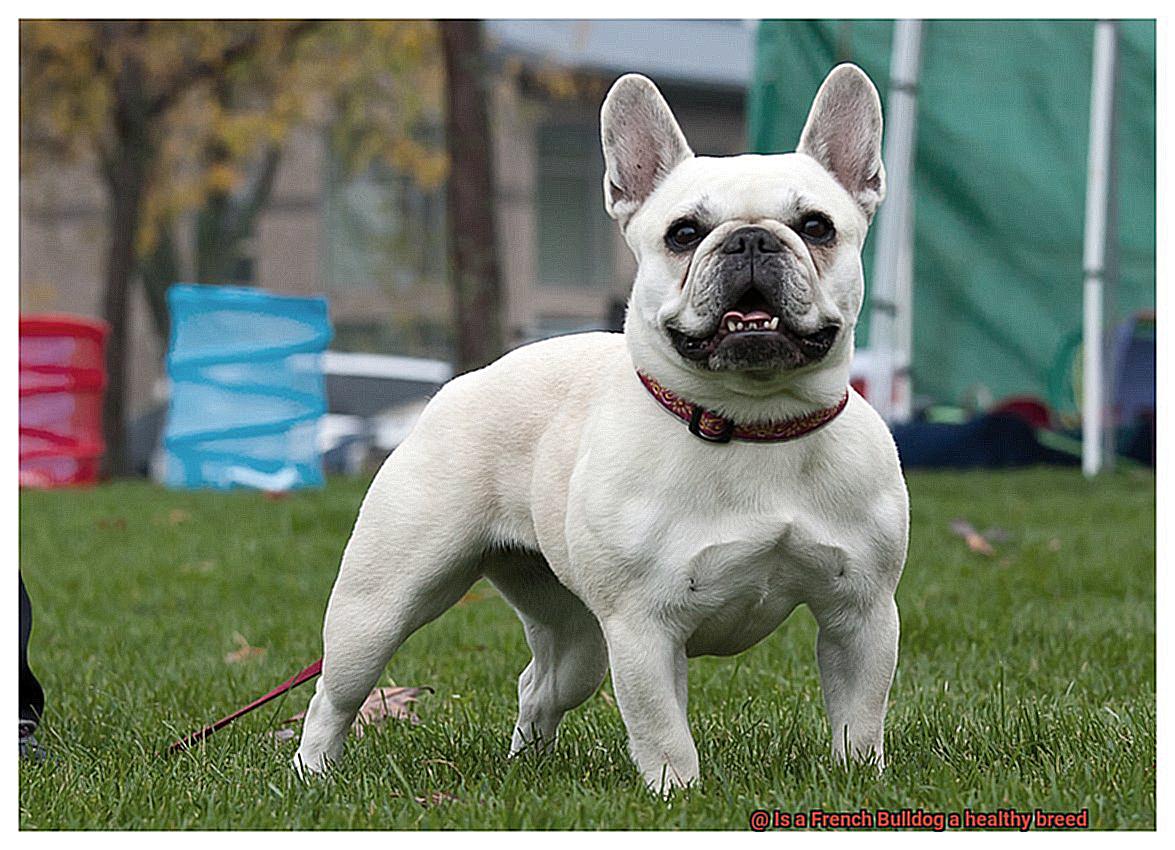Is a French Bulldog a healthy breed?
Welcome to our blog post all about the health of French Bulldogs. If you’re thinking about bringing a furry friend into your family, you might want to consider this breed. Not only are they super cute, but they also tend to be pretty healthy overall.
French Bulldogs are known for their small size and lovable personalities, which is why so many people adore them. But one of the best things about French Bulldogs is that they don’t have as many health issues as some other breeds. With the right care and attention, these little guys can live long and happy lives, bringing joy to their owners.
First off, French Bulldogs aren’t prone to a ton of serious health problems like some other breeds are. While every dog is different and can still have health issues, French Bulldogs generally have fewer breed-specific concerns. So as long as you take them for regular check-ups at the vet and feed them a balanced diet, chances are they’ll stay healthy and active.
Another great thing about French Bulldogs is that they don’t need a ton of exercise. A daily walk and some playtime should do the trick to keep them happy and stimulated. This means they’re perfect for people who don’t have a big yard or a lot of time for long walks. They’re even great for apartment living.
And get this – French Bulldogs actually tend to live pretty long lives compared to bigger dog breeds. On average, they can live anywhere from 10 to 12 years. That’s a lot of years filled with love and cuddles from your adorable Frenchie.
Now, it’s important to remember that each individual dog is unique and may have different health needs. But overall, French Bulldogs are known for being relatively healthy, which makes them an awesome choice if you’re looking for a lifelong companion.
In our next blog post, we’ll dive deeper into specific health considerations for French Bulldogs and give you tips on how to keep your pup feeling their best. So stay tuned and get ready to learn all about how to keep your French Bulldog healthy and happy.
What Are the Common Health Issues of French Bulldogs?
Contents
- 1 What Are the Common Health Issues of French Bulldogs?
- 2 How Can I Prevent Health Issues in My French Bulldog?
- 3 The Benefits of Choosing a Reputable Breeder
- 4 How to Create an Environment for Optimal Health in Your French Bulldog
- 5 Tips for Regular Veterinary Check-Ups and Examinations
- 6 Nutritional Needs for a Healthy French Bulldog
- 7 Exercise Recommendations for French Bulldogs
- 8 Signs of Poor Health in French Bulldogs
- 9 Conclusion
French Bulldogs are adorable and affectionate dogs known for their unique appearance and playful personalities. However, like any other breed, they have certain health issues that potential owners should be aware of. In this article, we will explore the common health problems that French Bulldogs may encounter and provide helpful tips for keeping them healthy and happy.
Is a French Bulldog a healthy breed?
French Bulldogs are generally considered to be a healthy breed, but they do have certain health issues that potential owners should be aware of. It’s important to note that not all French Bulldogs will experience these health problems, but being aware of them can help you make informed decisions and take proactive measures to ensure your furry friend’s well-being.
Respiratory Problems
One of the most prominent health issues in French Bulldogs is respiratory problems. Due to their brachycephalic (short-nosed) facial structure, they can experience difficulty breathing and are prone to conditions like elongated soft palate, stenotic nares, and tracheal stenosis. These conditions can lead to snoring, wheezing, and even respiratory distress. To help alleviate these issues, it’s important to keep your French Bulldog in a cool and well-ventilated environment, avoid vigorous exercise in hot weather, and provide plenty of fresh water.
Allergies
French Bulldogs are also prone to allergies, both food and environmental. These allergies can cause skin irritations, itching, and hair loss. Identifying the allergens causing the reactions is crucial for managing their allergies effectively. Consult with your veterinarian to develop an appropriate diet plan or recommend hypoallergenic pet products.
Eye Problems
French Bulldogs are susceptible to various eye problems, including cherry eye, corneal ulcers, cataracts, and progressive retinal atrophy (PRA). Regular eye examinations by a veterinarian are essential to catch these issues early on and provide appropriate treatment. Keep their eyes clean and free from debris to minimize the risk of infections.
Skin Problems

Skin problems are prevalent in French Bulldogs due to their wrinkled skin. They often suffer from skin fold dermatitis, which can become infected if not properly cleaned and dried. Additionally, they are prone to pyoderma, a bacterial skin infection, as well as other skin conditions like atopic dermatitis. Regular grooming and cleaning of their skin folds can help prevent these issues.
Section 6: Heatstroke
French Bulldogs have a compromised respiratory system, making them susceptible to heatstroke. It is crucial for owners to be vigilant and take necessary precautions during hot summer months. Ensure they have access to shade, provide plenty of water, and avoid exercising them during the hottest parts of the day.
How Can I Prevent Health Issues in My French Bulldog?
In this article, I will share my insights and experiences on how to prevent common health issues in French Bulldogs. So, let’s jump right in.

Regular veterinary check-ups:
Scheduling regular visits to the veterinarian is crucial for maintaining your French Bulldog’s health. Vets can detect early signs of potential health issues, administer vaccinations, and provide appropriate treatments if necessary.
Balanced diet:
Feeding your French Bulldog a well-balanced and nutritious diet is essential. Consult with your vet to determine the right type of food and portion sizes based on your dog’s specific needs. Avoid feeding them table scraps or foods that are toxic to dogs.
Moderate exercise:
French Bulldogs have a unique brachycephalic breed that can make exercise more challenging for them. Engage in moderate exercise activities like short walks or playtime indoors to prevent overexertion and respiratory difficulties.
Weight management:
Obesity can lead to various health problems in French Bulldogs. Monitor your dog’s weight closely and adjust their diet and exercise routine accordingly to maintain a healthy weight.
Dental care:
Implement a regular dental care routine to prevent dental issues such as periodontal disease and tooth decay. Brush your dog’s teeth regularly and provide dental chews or toys for better oral hygiene.
Proper grooming:
Regular grooming helps maintain your French Bulldog’s skin and coat health. Brush their coat regularly to prevent matting, and clean their facial folds daily to prevent infections.

Temperature control:
French Bulldogs are sensitive to extreme temperatures due to their short nose and compromised respiratory system. Keep them indoors during hot weather, provide shade and water when outside, and protect them from cold weather with warm shelter and clothing if necessary.

Responsible breeding:
If you plan to breed your French Bulldog, ensure both the male and female dogs are healthy and free from genetic health issues. Work with a reputable breeder or veterinarian to minimize the risk of passing on hereditary problems.
Regular parasite prevention:
Protect your French Bulldog from external and internal parasites by following a regular preventive medication schedule recommended by your vet.
The Benefits of Choosing a Reputable Breeder
You’ve decided to add a French Bulldog to your family? Congratulations. These adorable little bundles of joy are known for their playful nature and affectionate personalities.

But before you bring home your new furry friend, it’s important to consider where you are getting your puppy from. Choosing a reputable breeder can make all the difference in ensuring that you have a healthy and well-adjusted French Bulldog. Let’s explore some of the benefits of selecting a reputable breeder:
- Health and Well-being: Reputable breeders prioritize the health and well-being of their dogs. They conduct thorough health screenings and genetic testing to ensure that their breeding dogs are free from any hereditary health issues. This helps to reduce the risk of passing on genetic disorders to the puppies.
- Veterinary Care: Reputable breeders provide proper veterinary care for their dogs. They regularly take their dogs to the vet for check-ups, vaccinations, and preventive treatments. This helps to keep the breeding dogs in optimal health and ensures that the puppies start their lives with a strong immune system.
- Socialization: Reputable breeders prioritize the socialization of their puppies. They expose the puppies to various environments, noises, and people from an early age, which helps them develop into well-adjusted and confident dogs. This socialization process is crucial for preventing behavioral issues in the future.
- Lifetime Support: Reputable breeders offer lifetime support and guidance to puppy buyers. They are always available to answer any questions or concerns that may arise throughout the dog’s life. This support system is invaluable, especially for first-time dog owners who may need guidance on training, nutrition, or health concerns.
- Responsible Breeding Practices: Reputable breeders are committed to responsible breeding practices. They do not overbreed their dogs or participate in unethical practices such as puppy mills or backyard breeding. Instead, they focus on producing healthy and well-rounded puppies that conform to breed standards.
- Proper Documentation: Reputable breeders provide proper documentation and pedigrees for their puppies. They maintain accurate records of health screenings, vaccinations, and lineage. This transparency ensures that buyers have all the necessary information about the puppy’s background and health history.
How to Create an Environment for Optimal Health in Your French Bulldog
French Bulldogs are adorable and lovable companions, but they can be prone to certain health issues due to their unique physical characteristics. To ensure the optimal health of your French Bulldog, it is crucial to create an environment that promotes their well-being. By following these guidelines, you can help your furry friend live a long and healthy life.
- Provide a balanced diet: French Bulldogs are prone to obesity, so it is crucial to feed them a well-balanced diet. This means offering high-quality dog food that is specifically formulated for their breed and age. Avoid feeding them table scraps or human food, as this can lead to weight gain and digestive issues. Consult with your veterinarian to determine the best diet plan for your French Bulldog’s specific needs.
- Regular exercise: French Bulldogs may have a tendency to be lazy, so it is important to provide them with regular exercise. Take them for daily walks or engage them in interactive playtime to keep them active and prevent weight gain. However, it is essential to avoid overexerting them, as they are brachycephalic dogs and can easily overheat. Be mindful of the weather conditions and limit exercise during hot days.
- Provide mental stimulation: French Bulldogs are intelligent dogs and require mental stimulation to prevent boredom. Offer them interactive toys or engage in training sessions to keep their minds active. This can help prevent destructive behavior and promote overall mental health. Puzzle toys or treat-dispensing toys are great options to keep their minds engaged.
- Ensure proper dental care: Dental issues are common in French Bulldogs, so it is essential to establish a regular dental care routine. Brush their teeth regularly using dog-friendly toothpaste and provide dental chews or toys to help maintain good oral hygiene. Regular dental care can prevent gum disease, tooth decay, and bad breath.
- Regular veterinary check-ups: Schedule regular veterinary check-ups for your French Bulldog to ensure their overall health. This includes vaccinations, parasite prevention, and routine examinations. Regular vet visits can help identify any health issues early on and prevent them from worsening. Your veterinarian can also provide personalized advice and recommendations based on your dog’s specific needs.
- Maintain a clean environment: Keep your French Bulldog’s living space clean and free from hazards. Regularly clean their bedding, toys, and feeding bowls to prevent the buildup of bacteria. Additionally, ensure that your home is free from toxic plants or substances that can be harmful if ingested by your dog. French Bulldogs have sensitive skin, so using mild and hypoallergenic cleaning products is recommended.
Tips for Regular Veterinary Check-Ups and Examinations
Regular veterinary check-ups and examinations are essential for maintaining the health and well-being of your French Bulldog. These visits to the vet can help identify any potential health issues early on, ensuring that your furry friend receives the necessary care and treatment. Here are some tips to help you prioritize your French Bulldog’s health:
- Establish a relationship with a trusted veterinarian: Finding a veterinarian who specializes in French Bulldogs or has experience with brachycephalic breeds is crucial. They will be familiar with the specific health concerns and needs of your French Bulldog, providing tailored care.
- Schedule regular appointments: For healthy adult French Bulldogs, it is recommended to schedule veterinary check-ups once or twice a year. Puppies and senior dogs may require more frequent visits. These appointments allow veterinarians to conduct thorough physical examinations and address any concerns.
- Vaccinations: Vaccinations are an important part of preventive care for French Bulldogs. Your veterinarian will develop a vaccination schedule tailored to your dog’s needs, protecting them against diseases like distemper, parvovirus, rabies, and canine influenza.
- Parasite prevention: French Bulldogs are susceptible to fleas, ticks, heartworms, and intestinal parasites. Your veterinarian may recommend appropriate preventive medications to protect your dog against these parasites. Regularly checking for signs of infestation and promptly treating any issues is crucial.
- Dental care: Dental health is often overlooked but is crucial for overall well-being. Regular dental check-ups and cleanings can prevent dental diseases such as gum inflammation, tooth decay, and bad breath. Your vet may also provide guidance on proper dental care at home, including regular brushing.
- Open communication: Use regular check-ups as an opportunity to discuss any concerns or changes you’ve noticed in your French Bulldog’s health or behavior. Your veterinarian can provide guidance on nutrition, exercise, and behavioral issues, ensuring your dog’s well-being.

Nutritional Needs for a Healthy French Bulldog
To ensure that your furry friend stays happy and healthy, it’s crucial to understand their specific nutritional needs. In this guide, we will explore the key aspects of a French Bulldog’s diet that can help them thrive.

Quality Food Matters:
Feeding your French Bulldog high-quality dog food is the foundation of their nutrition. Look for dog food that prioritizes real meat as the main ingredient and avoids artificial additives, fillers, and by-products. Remember, your Frenchie deserves the best.
Protein Power:
Protein is essential for muscle development and maintenance in French Bulldogs. Opt for dog foods that contain high-quality animal-based proteins like chicken, turkey, or fish. These proteins provide the necessary amino acids that support your Frenchie’s overall health.
Fat Balance:
While fat is a concentrated source of energy for your French Bulldog, it’s important to strike a balance. Too much fat can lead to weight gain and obesity, which can be particularly problematic for this breed. Look for moderate levels of healthy fats like fish oil or flaxseed oil in their diet.
Complex Carbs are Key:
Choosing complex carbohydrates over simple sugars is crucial for your Frenchie’s energy levels. Whole grains and vegetables provide a steady release of energy, while simple sugars can cause blood sugar spikes. Additionally, incorporating fiber-rich carbohydrates can promote healthy digestion in your furry friend.
Vitamins and Minerals:
French Bulldogs require specific vitamins and minerals to support their overall health. Antioxidant vitamins like C and E boost their immune system, protecting against cellular damage. Essential minerals like calcium and phosphorus are vital for bone health and development. Consult with your veterinarian to determine if any additional supplements are necessary.
Portion Control:
French Bulldogs have a tendency to overeat, which can lead to weight gain and associated health issues. To prevent this, follow the feeding guidelines provided by the dog food manufacturer based on your Frenchie’s age, weight, and activity level. Regularly monitor their body condition and adjust their food intake accordingly.
Exercise Recommendations for French Bulldogs
Are you wondering how to keep your adorable pooch in tip-top shape? Well, you’ve come to the right place. As an expert in all things French Bulldogs, I’m here to share some exercise recommendations that will keep your Frenchie fit, fabulous, and full of energy.
- Take a Daily Walk: French Bulldogs are not known for their high energy levels. A daily walk of at least 30 minutes is usually sufficient to keep them healthy and happy. Grab that leash, put on your walking shoes, and enjoy a brisk stroll with your furry friend. It’s a great way to bond and get some exercise at the same time.
- Keep it Moderate: While some dogs may be able to handle more intense exercise, it’s important to remember that French Bulldogs have a unique respiratory system due to their brachycephalic nature. This means they have a short snout and can have difficulty breathing during strenuous activities. Stick to moderate exercise like brisk walking or light jogging to avoid putting too much strain on their respiratory system.
- Make it Fun and Interactive: French Bulldogs are intelligent dogs who thrive on mental stimulation. Incorporate interactive games and puzzle toys into their exercise routine to keep their minds sharp and prevent boredom. You can also try basic obedience training, which not only provides mental stimulation but also helps reinforce good behavior.
- Watch Out for the Heat: French Bulldogs are prone to overheating due to their compromised breathing ability. It’s crucial to exercise them during cooler parts of the day, such as early morning or late evening, to prevent heat exhaustion or heatstroke. And don’t forget the essentials – plenty of water and shade during outdoor activities.
- Low-Impact Activities: Avoid high-impact exercises that can strain your Frenchie’s joints and respiratory system. Instead, opt for low-impact activities like swimming or gentle play sessions in a fenced yard. These activities provide a great workout without putting excessive strain on their delicate bodies.
- Protect Those Paws: French Bulldogs have sensitive paws that can be easily injured on hot pavement or rough terrain. Stick to softer surfaces like grass whenever possible, and consider using protective booties if you need to walk on challenging surfaces.
- Consult with Your Vet: Every French Bulldog is unique, and their exercise needs may vary based on factors such as age, health condition, and personal preferences. It’s always a good idea to consult with your veterinarian for personalized exercise recommendations for your specific dog.

Remember, keeping your French Bulldog active and healthy is a key part of being a responsible pet owner. By following these exercise recommendations, you’ll not only keep your Frenchie fit but also strengthen the bond between you and your furry friend. So go ahead, lace up those shoes, grab that leash, and let’s get moving.
Signs of Poor Health in French Bulldogs
French Bulldogs are adorable and lovable pets, but they can be prone to certain health issues. As an expert, it’s important to know the signs of poor health in French Bulldogs so that you can provide the best care for your furry friend. Here are some common signs to watch out for:
- Difficulty Breathing: Due to their short snouts and flat faces, French Bulldogs are susceptible to brachycephalic airway syndrome. This can cause breathing difficulties, especially during exercise or in hot weather. Look out for excessive panting, wheezing, or struggling to catch their breath.
- Skin Issues: French Bulldogs are prone to allergies, infections, and dermatitis, which can lead to redness, itching, rashes, and hair loss. Keep their skin clean and dry through regular grooming and provide a balanced diet with essential fatty acids to support healthy skin.
- Gastrointestinal Problems: French Bulldogs have sensitive digestive systems and can develop food allergies or intolerances. Frequent vomiting, diarrhea, or bloating may indicate an underlying issue and should be addressed by a veterinarian.
- Eye Problems: Keep an eye on your Frenchie’s eyes. They are prone to conditions like cherry eye, dry eye, or corneal ulcers. Watch out for excessive tearing, redness, swelling, discharge, or cloudiness in their eyes.
- Joint Issues: French Bulldogs can suffer from joint problems like hip dysplasia and patellar luxation. These conditions can cause pain, lameness, and difficulty in mobility. Provide regular exercise appropriate for their breed and monitor their weight to reduce the risk of joint issues.
- Obesity: French Bulldogs have a hearty appetite and are prone to obesity if not properly managed. Monitor their weight and provide a balanced diet along with regular exercise to prevent weight gain.
R5Vt-xhso0Y” >
Conclusion
In conclusion, it is important to consider the health implications of owning a French Bulldog.
While they may be adorable and charming companions, this breed is unfortunately prone to a variety of health issues. From respiratory problems due to their short snouts to skin allergies and joint disorders, French Bulldogs require special care and attention.
Regular visits to the vet, proper nutrition, and exercise are crucial for their well-being. It’s essential to be aware of these potential health concerns before bringing a French Bulldog into your home.
However, with proper care and responsible breeding practices, it is possible to mitigate some of these risks and ensure a healthier life for your furry friend.




